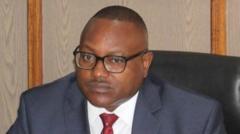Zambia's Foreign Minister Mulambo Haimbe has issued a stern warning to foreign diplomats, urging them to refrain from interfering in the nation’s internal matters. This announcement comes on the heels of US Ambassador Michael Gonzales highlighting a concerning issue regarding the "systematic theft" of life-saving drugs sent to Zambia from the United States.
Haimbe criticized an “increasing tendency” among diplomats to bypass traditional diplomatic discussions, asserting that this undermines mutual respect between nations. Although he did not specify any names, many interpreted his remarks as a direct response to Gonzales. Last week, the US ambassador convened a press conference to announce that the US would be cutting down health aid to Zambia by $50 million due to allegations that the medications were being illegally sold rather than distributed to patients in need.
Gonzales disclosed that after more than 30 unsuccessful meetings with Zambian officials, he felt compelled to bring the matter to public attention. In response, Haimbe stressed that reaching out through the media constitutes an interference in state affairs and a violation of diplomatic norms. He reiterated that Zambia is willing to discuss pertinent issues through the appropriate diplomatic protocols.
Furthermore, gathering evidence on this alleged corruption, the US embassy claimed to have presented their findings to Zambian officials as early as April of last year and had offered assistance to ameliorate the situation and facilitate justice against the wrongdoers. However, they reported that no substantive actions were taken by the Zambian authorities.
According to Zambia’s Home Affairs Minister Jacob Mwiimbu, a comprehensive forensic audit has been completed and forwarded to security agencies for examination. He noted that more than 75 arrests have been executed nationwide, following a sweep that took place across over 400 health facilities alleged to be involved in the fraud.
Mwiimbu assured the public that the legal proceedings would treat everyone equally without safeguarding any individuals, stating, “There will be no sacred cows in this pursuit.” In an inspection conducted last year by US officials across over 2,000 pharmacies, many were found to be selling medications donated by the US government.
Zambia’s Health Minister Elijah Muchima highlighted that the corruption issues predated the current administration, which has been in power since 2021. Because of the serious nature of the issue, several officials in Zambia have already been dismissed, and an advanced digital tracking system has been implemented to oversee the supply of medicines.
The upcoming reduction in US aid will notably impact drugs essential for treating malaria, HIV, and tuberculosis beginning next year. However, Minister Muchima assured the public that there is currently no risk of drug shortages as there remains ample supplies.
It’s noteworthy that the recent action from the US is separate from the foreign aid freeze previously imposed by former President Donald Trump, which has had widespread effects on health programs throughout Africa, including critical medical supply shipments. In response to this, Zambia's President Hakainde Hichilema emphasized the need for the country to enhance its financial systems to procure its medications independently.
The US reportedly contributes approximately one-third of Zambia's public health expenditure, underscoring the significance of US-Zambia relations in ensuring the nation's healthcare stability.




















